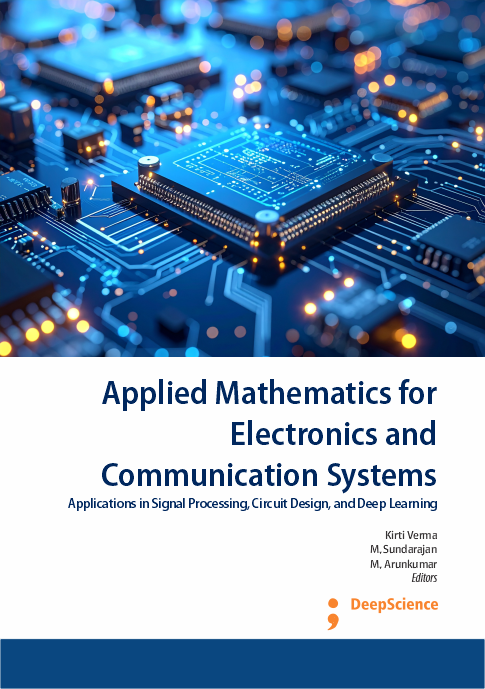Applied Mathematics for Electronics and Communication Systems: Applications in Signal Processing, Circuit Design, and Deep Learning
Keywords:
Signal Processing, Fourier Transform, Machine Learning, Linear Algebra, Communication Systems, Deep Learning, Digital Signal ProcessingSynopsis
Mathematics is the silent architect behind every pulse of signal, every modulated wave, and every digital circuit in the world of electronics and communication engineering. It provides not only the language through which complex physical phenomena are expressed but also the foundation upon which modern technologies are built. From Fourier analysis and linear algebra to probability theory and differential equations, mathematical principles empower engineers to analyze, model, optimize, and innovate with precision and confidence.
This book "Mathematical Foundations and Their Pivotal Role in Electronics and Communication Systems" aims to bridge the often-perceived gap between abstract mathematical theory and its real-world application in electronics. It is designed for students, educators, researchers, and industry professionals who seek a deeper understanding of how core mathematical concepts drive progress in areas such as signal processing, communication systems, control theory, embedded systems, and semiconductor technology.
Each chapter focuses on a key mathematical domain and its specific contributions to engineering applications. Real-life examples, case studies, and practical illustrations are integrated to show how theory transforms into technology. Whether it is the use of Laplace transforms in system analysis, matrix operations in MIMO communications, or calculus in analog circuit designs this book unfolds the indispensable synergy between mathematics and engineering.
We hope this work inspires readers to appreciate the elegance of mathematics as not just a tool, but as a critical enabler of innovation in electronics and communication engineering.
References
Abd-Elhameed, W.M.; Ahmed, H.M.; Napoli, A.; Kowalenko, V. New Formulas Involving Fibonacci and Certain Orthogonal Polynomials. Symmetry 2023, 15, 736
Kim, I.; Rathie, A.K. A Note on Certain General Transformation Formulas for the Appell and the Horn Functions. Symmetry 2023, 15, 696.
Kim, I.; Paris, R.B.; Rathie, A.K. Some New Results for the Kampé de Fériet Function with an Application. Symmetry 2022, 14, 2588.
Albosaily, S.; Quintana, Y.; Iqbal, A.; Khan, W.A. Lagrange-Based Hypergeometric Bernoulli Polynomials. Symmetry 2022, 14, 1125.
Qureshi, M.I.; Choi, J.; Shah, T.R. Certain Generalizations of Quadratic Transformations of Hypergeometric and Generalized Hypergeometric Functions. Symmetry 2022, 14, 1073.
Mohammed, A.O.; Kilicman, A.; Awad, M.M.; Rathie, A.K.; Rakha, M.A. Another Method for Proving Certain Reduction Formulas for the Humbert Function ψ2 Due to Brychkov et al. with an Application. Symmetry 2022, 14, 868.
Choi, J.; Kurumujji, S.K.; Kilicman, A.; Rathie, A.K. Certain Integral Formulae Associated with the Product of Generalized Hypergeometric Series and Several Elementary Functions Derived from Formulas for the Beta Function. Symmetry 2022, 14, 389
Lim, D. Some Explicit Expressions for Twisted Catalan-Daehee Numbers. Symmetry 2022, 14, 189.
Reynolds, R.; Stauffer, A. A Note on the Summation of the Incomplete Gamma Function. Symmetry 2021, 13, 2369.
O’Regan, D. Maximal Type Elements for Families. Symmetry 2021, 13, 2269.
Batir, N.; Sofo, A. Finite Sums Involving Reciprocals of the Binomial and Central Binomial Coefficients and Harmonic Numbers. Symmetry 2021, 13, 2002.
Ryoo, C.S.; Kang, J.Y. Some Symmetric Properties and Location Conjecture of Approximate Roots for (p, q)-Cosine Euler Polynomials. Symmetry 2021, 13, 1520.
Yasmin, G.; Islahi, H.; Choi, J. q-Generalized Tangent Based Hybrid Polynomials. Symmetry 2021, 13, 791.













